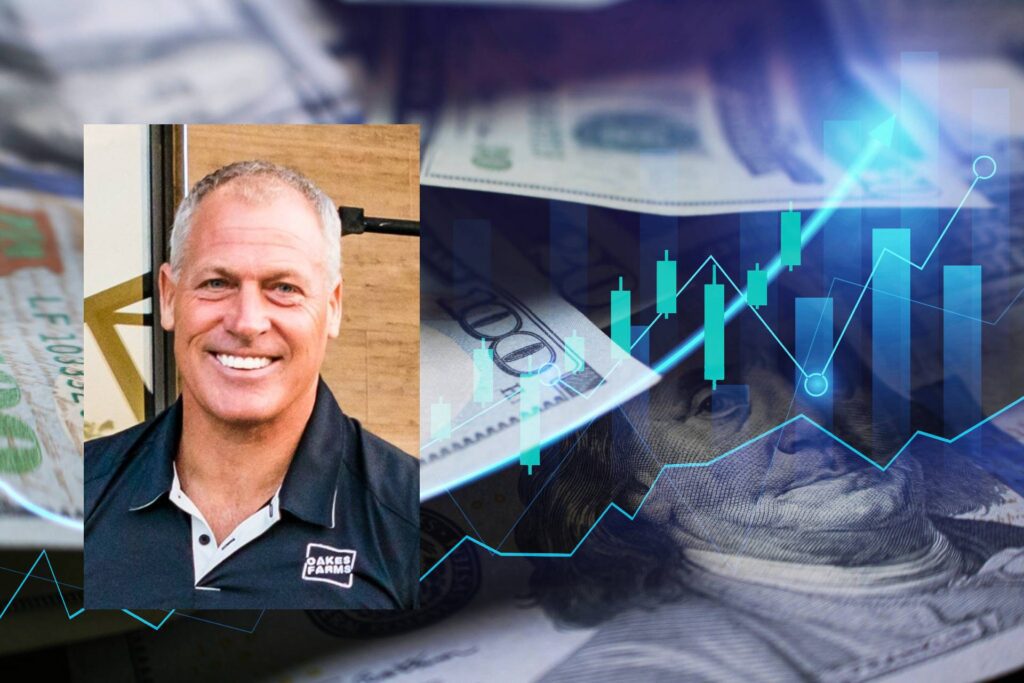Naples Farmer Talks About the Toll of Rising Prices
by PAUL CATALA
When Alfie Oakes was 15, he began selling tomatoes and watermelon from the back of a pickup at a Cape Coral bridge. By the time he was 18, he had opened his first retail market. By the age of 19, he had begun farming.
Thirty-eight years later, Oakes, 53, is now the founder and CEO of Oakes Farms, a Naples-based agribusiness that produces, packages, distributes, and sells fruits, vegetables, and other agricultural products.
After nearly four decades in the agriculture business, Oakes has gone on to become a successful Naples grocer who, in addition to owning the 3,200-acre Oakes Farms, owns Seed to Table Market, Oakes Farms Market, and Food & Thought 2 restaurant and market, all in Naples.
With his nearly four decades in the agriculture business, the outspoken Oakes has taken to print, the internet, and the airwaves lamenting the United States’ current rate of inflation, its impact on the farm industry, why it’s happening, and what needs to be done to curb it.
Speaking from Naples, Oakes – who has become known for his efforts of protecting individual liberty, limited government, and the free market system – blames inflation partly on a “clear manipulation on farm input products via people that want a globalist new world order.”
To that end, Oakes says 63 percent of U.S. publicly owned corporations are controlled by only about five different investment groups that are manipulating input costs such as direct materials, direct labor, and factory overhead.
That ends up putting additional cost burdens on farmers.
At the employee-owned Oakes Farms, for example, Oakes says he uses three rolls of plastic mulch per acre on the farm of the state’s biggest vegetable grower. When he was at 3,200 acres, that meant 10,000 rolls at $85 per roll in 2021. That cost is now $120 per roll.
“Next season, it should be the same price based on barrel price. But it’s $270 per roll – a 350 percent increase,” he says.
“There’s no logic behind it. Also, wood prices are up but not 300 percent, but tomato stakes are up 300 percent. Companies are being bought out and controlled by a manipulated market.”
Oakes says farm input costs such as seeds are up 50 percent, and fertilizer is up 100 percent; other input costs include fuel, plastics, labor and spray material, and all are up 500 percent from what they were in 1985.
“The simplest thing I can tell you in layman’s terms is that my input costs to grow my farm every year for the last four or five years have been about $40 million to $42 million. With the current increase of all the farm input costs for the next season, it’s going to be $17 million higher,” he says.
“There’s not one farm input cost that hasn’t gone up in weeks that are more than regular inflation. Farm input costs are up 200 to 300 percent.”
Oakes calls his farm a “vertically integrated company” with an annual $43 million investment and each year he allocates to make a $3 million loss.
“That sounds bizarre to the average person,” he says. “The only reason it’s not bizarre is I need the product. I sell to prominent chain stores that like to buy American products. Even if I’m losing some, I still come out and make money in the big picture. But hardly anyone wants to take that kind of risk.”
Oakes adds that out of the past 15 years that he’s farmed collectively, he’s been at “an enormous loss,” citing three out of 15 years that he made money.
“No one can lose millions and millions every year. So, unfortunately, the American consumer is going to see input costs in Quarter 4 of this year like they’ve never seen before. That just has to do with the inflation in the country,” says Oakes.
In addition to inflation, Oakes said competition with Mexican farms — many of which are run by drug cartels, he says — has helped fuel growth in those farms, which now dominate the market for vegetables. He asserts with the billions of dollars in drugs coming into the U.S. on produce trucks, there’s not much concern about farms losing money.
As far as the future of Florida farming, Oakes doesn’t see a big problem with shortages, but he does see an extreme spike in prices. He said although crop production has been good, U.S. farmers fighting the influx of cheap Mexican produce are forced to lower their prices. The more food that is sold for less than what it costs to grow, the more a farm loses.
“It’s really sad what’s happening all across the country when it pertains to food inflation. But more myopically, in Florida and South Florida, where we compete with Mexico, it’s been bad,” he says.
As for the future Florida farming market and rising production costs, Oakes says the lower middle-class households will be affected the most.
“Do I think as a result of this the people in Naples are going to be starving to death? I don’t think so. But we’re going to see food costs like we’ve never seen before.”
Oakes, who’s been outspoken about his political ideologies, says the conclusions he makes are based on his experience and what he’s heard from other farmers. He plans to continue farming, saying he’s never had to lay off employees and will transition to less acreage, producing more diversified farm products such as sauces, ketchup, mustard, and other condiments. He’ll also be adding direct marketing.
“It’s tough times; I wish I could find something positive about Florida farming, but it’s hard. But keep in mind, we’re going to take care of our own,” he concludes. “I’ll never retire. I’ll go out swinging; I love what I’m doing.”

